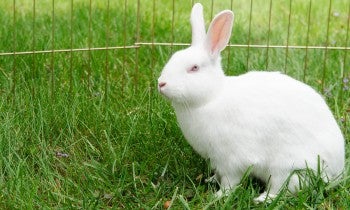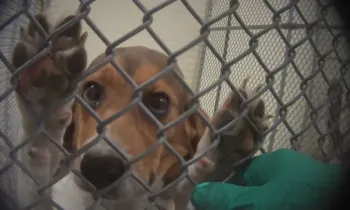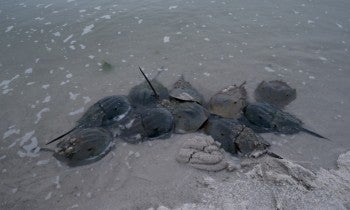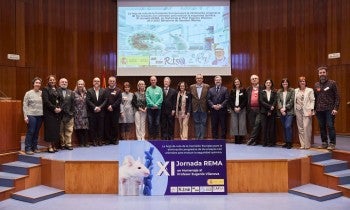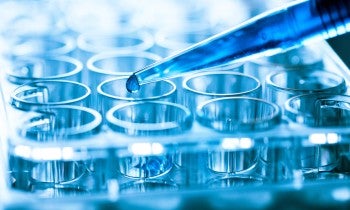Search
Found 197 results
Rabbit blood hair oil worth Rs. 2.82 lakhs seized following complaint by animal protection organization
CHENNAI—Acting on a formal complaint submitted by the Humane World for Animals India, formerly called Humane Society International India, the Tamil Nadu Drugs Control Department has seized products worth approximately Rs. 2.82 lakhs [nearly $4000 USD] from Garuda Herbals. The seized products include
Walkathon for lab animals calls for transition to non-animal science
DELHI (April 24, 2025) – On the occasion of World Day for Laboratory Animals, Humane World for Animals India (formerly Humane Society International India), in collaboration with the Society of Young Scientists (SYS), All India Institute of Medical Sciences, organized a walkathon in Delhi to urge
Humane World for Animals and Humane World Action Fund support NIH’s new commitment to reduce animal use in research
Humane World for Animals is spearheading a drive to spare horseshoe crabs from blood draining for medical testing around the globe
WASHINGTON―Horseshoe crab populations are on the decline, partly attributed to the use of their blood in medical testing. For decades, an effective replacement to the horseshoe crab blood-derived test has been available, and Humane World for Animals is working with regulators and the pharmaceutical
Companies, Politicians and Celebrities from Around the World Are Pledging to Be Cruelty-Free
Our campaign partners Our corporate partners
Costs of Animal and Non-Animal Testing
Some animal tests take months or years to conduct and analyze (e.g., 4-5 years, in the case of rodent cancer studies), at a cost of hundreds of thousands—and sometimes millions—of dollars per substance examined (e.g., $2 to $4 million per two-species lifetime cancer study). The inefficiency and
Animal Models of Human Disease
Basic and applied biological research is responsible for the greatest proportion of animal use in laboratory experiments, accounting for approximately three-quarters of the estimated 115+ million annual total worldwide. Attempts to model human diseases in other animal species—whether to study the
Animal Use Statistics
Only a small proportion of countries collect and publish data concerning their use of animals for testing and research, but it is estimated that more than 115 million animals—including mice, rats, birds, fish, rabbits, guinea pigs, farm animals, dogs, cats, and non-human primates—are used and/or
Animal Tests
Tests that use animals to assess the safety of chemicals and products such as cosmetics, pesticides and pharmaceutical drugs are still quite common. Although testing requirements differ from country to country and sector to sector, new ingredients that require safety assessment will very likely be
Changing Global Test Guidelines for Chemicals and Drugs
The International Councils on Animal Protection in OECD and Pharmaceutical Programmes (ICAPO and ICAPPP) are umbrella associations through which animal protection organisations, including HSI, interact with global chemical and pharmaceutical regulators who meet under the auspices of the Organisation
Australian cosmetic animal test ban bill passes Senate after government commits additional reinforcement measures to Humane Society International
CANBERRA – The Australian Senate has today passed the Government’s Industrial Chemicals Bills 2017, including measures to prohibit reliance on new animal test data for chemicals introduced into Australia for use as ingredients in cosmetics. Passage of the bill was made possible thanks to an
Alternatives in Product Testing
Alternatives to the use of animals in product testing include the elimination of redundant or needless study requirements, the replacement of animal tests with non-animal methods, and the modification of animal-based tests to both reduce the number of animals used and to minimise pain and distress
Alternatives in Scientific Research
In contrast to product testing, in which some animal use is required by law, there is no law requiring the use of animals to study basic biology, or the pathology and treatment of human illness. Here, animal experiments are a carry-over from the early days of biology and medicine. Increasingly
Animal Welfare Considerations - UPDATE
Some toxicity tests consume hundreds or thousands of animals per substance examined (e.g., lifetime cancer studies consume approximately 400 rats and 400 mice; a study of birth defects and developmental toxicity consumes 1,300 rats and/or 900 rabbits; and a study of sexual fertility and reproduction
Call for proposals: Progress in human disease research
Background BioMed21 is an initiative by Humane Society International and The Humane Society of the United States to support strategic scientific dialogue regarding the potential of extending the U.S. National Research Council vision of 21 st century toxicology to the wider field of biosciences. One
Convincing Europe to "REACH" Beyond Animal Testing
The European chemicals law, REACH (short for Registration, Evaluation and Authorisation of Chemicals), includes a commitment that animal testing will only be carried out as "a last resort," as well as a legal obligation to regularly update testing requirements to reduce and replace the use of
Be Cruelty-Free Friends
The following celebrities support Humane Society International's/The Humane Society of the United States' Be Cruelty-Free campaign, a global effort to end animal testing for cosmetics and personal care products. Join them at hsicanada.ca/becrueltyfree. Ke$ha “True beauty doesn’t come from cruelty
Experts united to advance non-animal testing methods at major Spanish conference
MADRID—The Spanish Network for Alternative Methods, known as REMA, with Humane World for Animals—formerly known as Humane Society International—and Animal-Free Safety Assessment hosted the XI REMA Conference on Feb. 20, 2025, at the Ministry of Health in Madrid. The conference, honouring the late
Action Plan to transition to animal-free innovation—the concrete way forward
BRUSSELS— The Intergroup on the Welfare and Conservation of Animals organised an extraordinary meeting on Accelerating the transition to animal-free innovation, in partnership with Eurogroup for Animals and Humane Society International/Europe. This special session featured a roundtable panel debate
Brazil prioritizes animal-free safety assessment of school supplies
RIO DE JANEIRO—Humane Society International is excited to announce that animal-free safety assessment of school supplies is now possible in Brazil. Previously, rats and rabbits were routinely used to test paints, glues and other school supplies. HSI worked together with Brazilian stakeholders to
